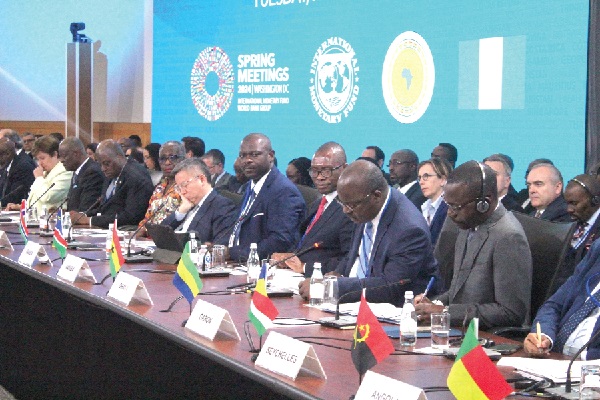
Africa needs stronger support from development partners — Dr Addison
The Governor of the Bank of Ghana (BoG), Dr Ernest Addison, has called for stronger support from development partners, as African central banks and governments continue to pursue domestic adjustment policies.
He said the domestic adjustment policy efforts without adequate financing could only yield limited results, in the context of the complex domestic and external environment.
As such, he said stronger support from the development partners, including the International Monetary Fund (IMF), remained paramount.
Dr Addison said this in a speech on behalf of African Central Bank Governors at the 2024 African Consultative Group (ACG) meeting with the Managing Director of the IMF, Kristalina Georgieva, at the ongoing IMF/World Bank meetings in Washington DC.
Speaking on the topic ‘Bolstering Africa’s Financing through the Overlapping Crises and Beyond’, he said considering the low catalytic effect of IMF financing, lots of African countries view the countercyclical role of IMF financing as indispensable.
He said Africa continued to face complex challenges against the backdrop of successive shocks, manifesting in a subdued post-pandemic recovery, elevated debt distress, and a persistent funding squeeze, that had amplified income divergences and undermined the achievement of sustainable and inclusive growth.
Context
The African continent is currently faced with financing challenges as a result of a debt crisis, with some countries defaulting on their loan repayments while some opt for a debt restructuring.
Data from the IMF in 2023 indicated that ten countries were in debt distress, with nine of them from Africa. The Fund also indicated that over half of low-income African countries were either potentially or actually experiencing difficulties in serving their debts.
This debt crisis has led to the closure of the international capital markets in some African countries, including Ghana.
In many heavily indebted nations, debt restructuring has become necessary to bring debt burdens back to sustainable levels and limit the negative impact of greater debt servicing on what is already a fragile socioeconomic environment.
Countries such as Ghana, Ethiopia, Zambia and Chad have all applied for debt restructuring under the Common Framework for debt treatment.
In Ghana, the country is currently engaging both its bilateral and external commercial creditors as it seeks to restructure debts of about $20 billion.
The country is looking forward to formalising its agreement with the Bilateral Official Creditors Committee (OCC), co-chaired by France and China, to restructure bilateral debts of about $5.4 billion.
The country is also engaging with investors in its Eurobonds as it seeks to restructure commercial debts of about $14 billion, out of which $13 billion are in Eurobonds.
Changing global conditions
Dr Addison said the continent views the continued pragmatism and agility of IMF’s policies to changing global conditions as paramount to better serve its vulnerable members.
“To this end, we underline the necessity for the upcoming comprehensive review of Low Income Countries (LIC) facilities to maintain the Poverty Reduction and Growth Trust’s (PRGT) concessionality and promote higher access to reverse erosion amplified by the global inflationary episode.
“We also underscore the criticality of replenishing the Catastrophe Containment and Relief Trust (CCRT) resources envelope to offer grant support to our most vulnerable members in this shock-prone world,” he stated.
He said considering the expiry of the Food Shock Window amidst a food crisis triggered by the El Nino phenomenon, Fund emergency financing alongside augmentations in programme countries would be important to close climate-induced financing gaps.
“In this regard, we call for intensified fundraising efforts under the second phase of the resource mobilisation initiatives,” he said.
Meaningful collaboration
Dr Addison said African central banks were also calling for meaningful collaboration between the IMF and the World Bank to better align their support to LICs.
“In this regard, we stress the need for coordination of the IMF’s LIC Facilities Review with the World Bank’s 21st replenishment of the International Development Association (IDA21) to support LICs in a holistic manner,” he stated.
Dr Addison also stressed the need to keep all financing options on the table, including the use of the IMF’s internal resources.
He said in view of the recent multiple shocks and a crisis like no other, now is the opportune time for a modest gold sale, particularly when gold prices were still favourable.
“Finally, we restate our request for further enhancements to the G20 Common Framework while leveraging the Global Sovereign Debt Roundtable (GSDR) to promote rapid, transparent and equitable resolution of debt, as well as facilitate debt cancellation for the most vulnerable members.
“The review of the Fund’s internal debt policy is welcome, but we stress the need to ensure that the changes are impactful and achieve their intended purpose,” he said.